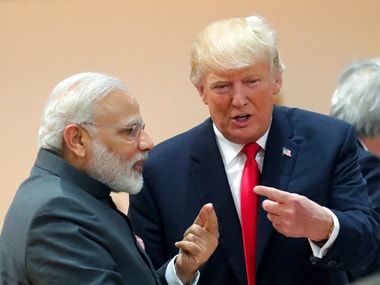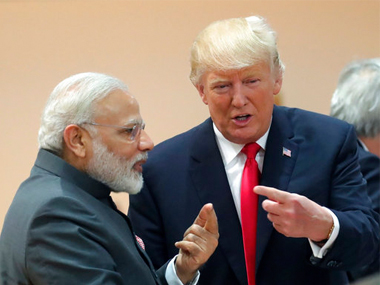The trajectory of US-India relationship is steadily progressing towards greater strategic convergence underwritten by shared values, economic and security interests. The multi-dimensional, symbiotic relationship has found bipartisan acceptance among the leadership in both nations. The increasing closeness is reliant on factors bilateral, internal and external. For instance, trade and defence partnership between the two countries has witnessed a major recent uptick but ties have equally been shaped by stark shifts in global power structures and geopolitical circumstances. In the words of former US Secretary of State Rex Tillerson, “the emerging Delhi-Washington strategic partnership stands upon a shared commitment upholding the rule of law, freedom of navigation, universal values, and free trade. Our nations are two bookends of stability – on either side of the globe – standing for greater security and prosperity for our citizens and people around the world. " . Yet, the grand architecture hides surprising vulnerabilities. Recent developments have exposed the fundamental frailties of a partnership that has everything going for it but for a considerable gap between expectations and reality. A simmering tension has bubbled to the surface following India’s decision to undertake some outreach initiatives to Russia, North Korea and China — countries that share competing and adversarial relationship with the US. In the corridors of a transactional White House, India’s engagement with China has caused a murmur of surprise and its defence deals with Russia a faint alarm, leading Ram Madhav, an influential figure in the Narendra Modi administration, to reassure Washington that the modalities of India-US ties are unaffected and are independent of India’s “de-hyphenated” foreign policy. Madhav, BJP general secretary, RSS ideologue and a troubleshooter for the Modi government, met senior White House and State Department officials to clarify that “India’s engagement with China, Russia or any other country would have no impact on bilateral ties with the US because the relationship is a “fundamental strategic priority for the long term,” according to a report in The Hindu. [caption id=“attachment_4481899” align=“alignleft” width=“380”]  File image of Narendra Modi and Donald Trump. AP[/caption] During an event in Washington, Madhav reiterated that “India is pursuing the de-hyphenated policy. We have certain regional imperatives that command us to establish relationship with powers of different poles in the region. But that does not affect the larger issues like the US-India bilateral relationship.” It is surprising that India needed to clear the air and stress upon such fundamental issues. But the fact that it felt constrained to do so, points to a lack of trust. If the Trump administration suffers from a lack of trust of India’s motives, then it could stem from either its inability to understand India’s strategic, economic and geopolitical concerns, or its impatience to see New Delhi assume a leadership role in maintaining the rules-based order in Indo-Pacific. It may have also irked the US, which adopts a monochromatic policy towards friends and allies with little space for nuance, that New Delhi’s stated actions in a few cases might make it difficult for Washington to achieve some of its political goals. The US has made no bones about the fact that if India, the world’s largest arms importer, continues to purchase high-end weapons systems from Russia and honour big-ticket deals (such as the procurement of five S-400 Triumf air defence systems at a cost of $4.5 billion), then New Delhi might make itself vulnerable to the stringent Countering America’s Adversaries Through Sanctions Act (CAATSA) that imposes sanctions on Russia, North Korea and Iran and mandates secondary sanctions on nations that trade with Russia’s defence and intelligence sectors. In response to India’s lobbying on this issue, the Trump administration made some conciliatory noises but has been quick to point out that when it comes to Congressional laws, the administration’s hands are tied. “CAATSA is a feature and we need to take it seriously. The (Trump) administration is always bound by US law. This is a US law. I’m hoping that not just India, but all of the partners that we engage with will understand that we will have to evaluate any potential large defence purchase from Russia seriously because that’s what the law demands of us,” Tina Kaidanow, principal deputy assistant secretary of state for political-military affairs, told reporters in Washington on Saturday. In referring to CAATSA, the Trump administration was trying to impose some political, strategic and moral costs on India to discourage it from buying Russian weapons. Unsaid in this message are twin motives. One, Washington clearly wants to displace Russia as the top arms exporter to India. Even in the middle of a dip, Russia comfortably remains on top with 62 percent share of the Indian market followed by the US at 15 percent and Israel at 11 percent. The Trump administration, which is aggressively pushing its America First campaign, sees an opportunity here. It is sending ambassador Kaidanow to India. A look at the press release from the US Department of State makes the motive clear. “In India, Ambassador Kaidanow will hold talks on defense trade and peacekeeping, which are among two key areas of the rapidly growing US-India partnership as envisioned in the Administration’s Indo-Pacific strategy. US-India bilateral defence trade has risen from near zero to $15 billion since 2008. India is projected to spend billions on military modernisation over the next decade, and talks will focus on expanding our security cooperation while furthering opportunities for American industry.” This is a wrinkle in bilateral ties. The US looks upon the size of the Indian market and its need for weapons upgradation as a huge opportunity to expand its presence. But this motive fails to recognise India’s economic and defence imperatives. India wants the US to act as an enabler of technological prowess in its quest to achieve some amount of self-sufficiency in arms production which also ties up with prime minister Narendra Modi’s ‘Make in India’ strategy. In Madhav’s words, India seeks US co-operation “especially (in) defence production. We are looking forward to investment and technology transfer. We would like to be seen not merely as a market, but as a manufacturing hub for Indo-Pacific and beyond.” Concurrently, it is difficult for India to close or majorly whittle down arms procurement from Moscow because not only is Indian military hardware still overwhelmingly Russian due to legacy issues, Russia has been more willing to satisfy India’s needs at the top end of the market where US high-tech systems are subject to export control regulations and conditional on India’s signing of foundational agreements. The second US motive in discouraging India to buy Russian weaponry is political. Kaidanow reiterated that penalising India or any US ally or partner through secondary sanctions isn’t the objective. “The intent is to emphasise how important it is that Russia’s malign behaviour all over the world is countered and by virtue of purchasing large-scale Russian system, what you’re doing is enabling that kind of behaviour.” The virtue-signalling hides an American inability to make its sanctions achieve the desired results. In near total absence of bilateral trade between the US and Russia, these sanctions may only bring some amount of pain on Moscow if other nations abstain from dealing with Russia. As Matthew Rojansky of the Wilson Center’s Kennan Institute says, “The US-Russia economic relationship is now so tiny and so attenuated… we have to rely on countries in Europe and third countries to actually impose the pain we want to impose. And the third thing is where the rubber hits the road. And that’s change Russian behavior. And that’s where the pattern after four years is not especially compelling. Nearly 200 individuals and entities have been sanctioned now. And yet the pattern is Russia still does the stuff we don’t like.” If the US wants India to take up a greater role in acting as a net security provider in Indo-Pacific or help it achieve political goals, it must show greater patience and respect for India’s strategic vulnerabilities and capacity constraints. As Adjunct Fellow at the Pacific Forum Atman Trivedi writes in New Republic, “If the US envisions India as a valuable partner to keep the Indo-Pacific free and open—as it seems to and should—it needs to address the gap between ambition and reality. India’s capacity to lead in the Indian Ocean should be atop the to-do list, as countries in India’s neighbourhood test the limits of their maneuverability with China as never before. What that means, practically, is adding real teeth to India’s recent designation as a “major defence partner” for military sales to allow it access to the best American equipment.” But there’s a more fundamental point to be made. India, due to its civilisational mores and past colonial experience, will never be a US ally or partner in the conventional sense. It wants to emerge as a dominant regional power and a leading global player in its own right, and it looks upon the US as a key enabler to that role. As Hudson Institute’s Aparna Pande observed while testifying on ‘Asia’s Diplomatic and Security Structure: Planning US Engagement’ at a hearing organised by the House Committee on Foreign Affairs, “India is different from traditional American allies whether in Europe, Latin America or Asia for whom the US was the key security provider. India would never want that kind of a relationship.” If this wrinkle is taken care of, India-US ties will achieve greater clarity. The US might figure out that India’s foreign policy outreach initiatives are not necessarily misaligned to its interests.
Simmering tension with the US has bubbled to the surface following India’s decision to undertake some outreach initiatives to Russia, North Korea and China.
Advertisement
End of Article


)

)
)
)
)
)
)
)
)



